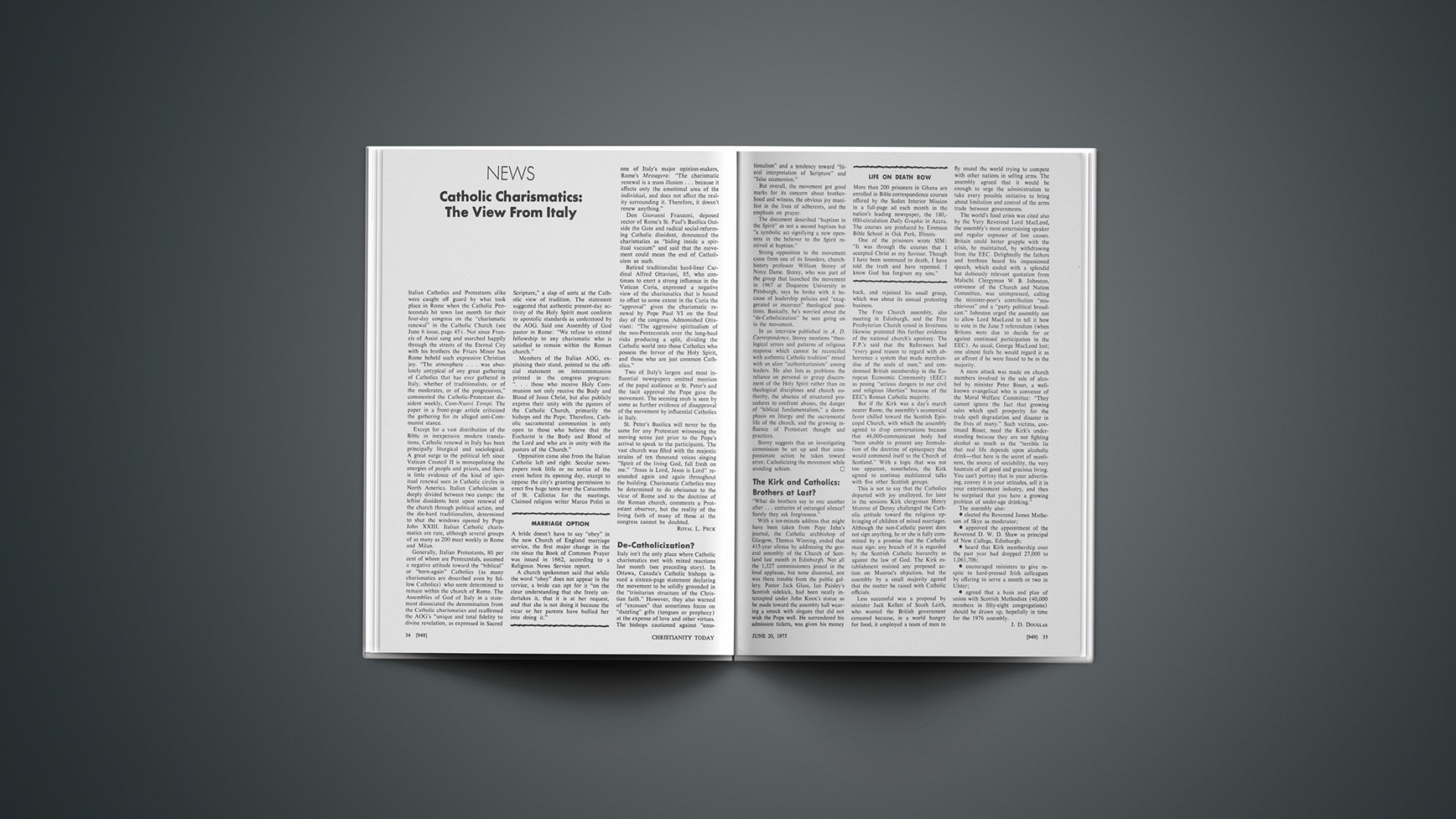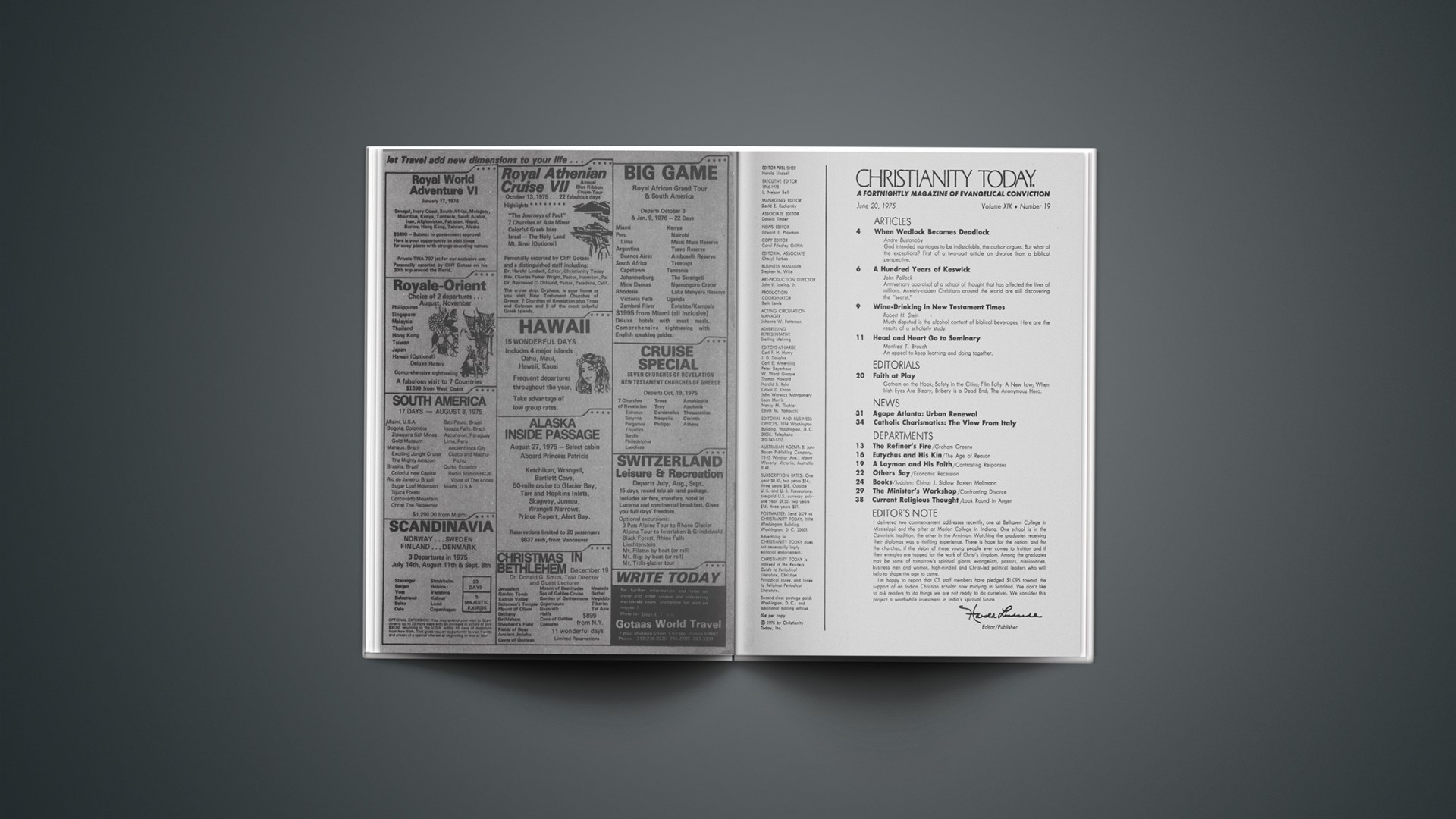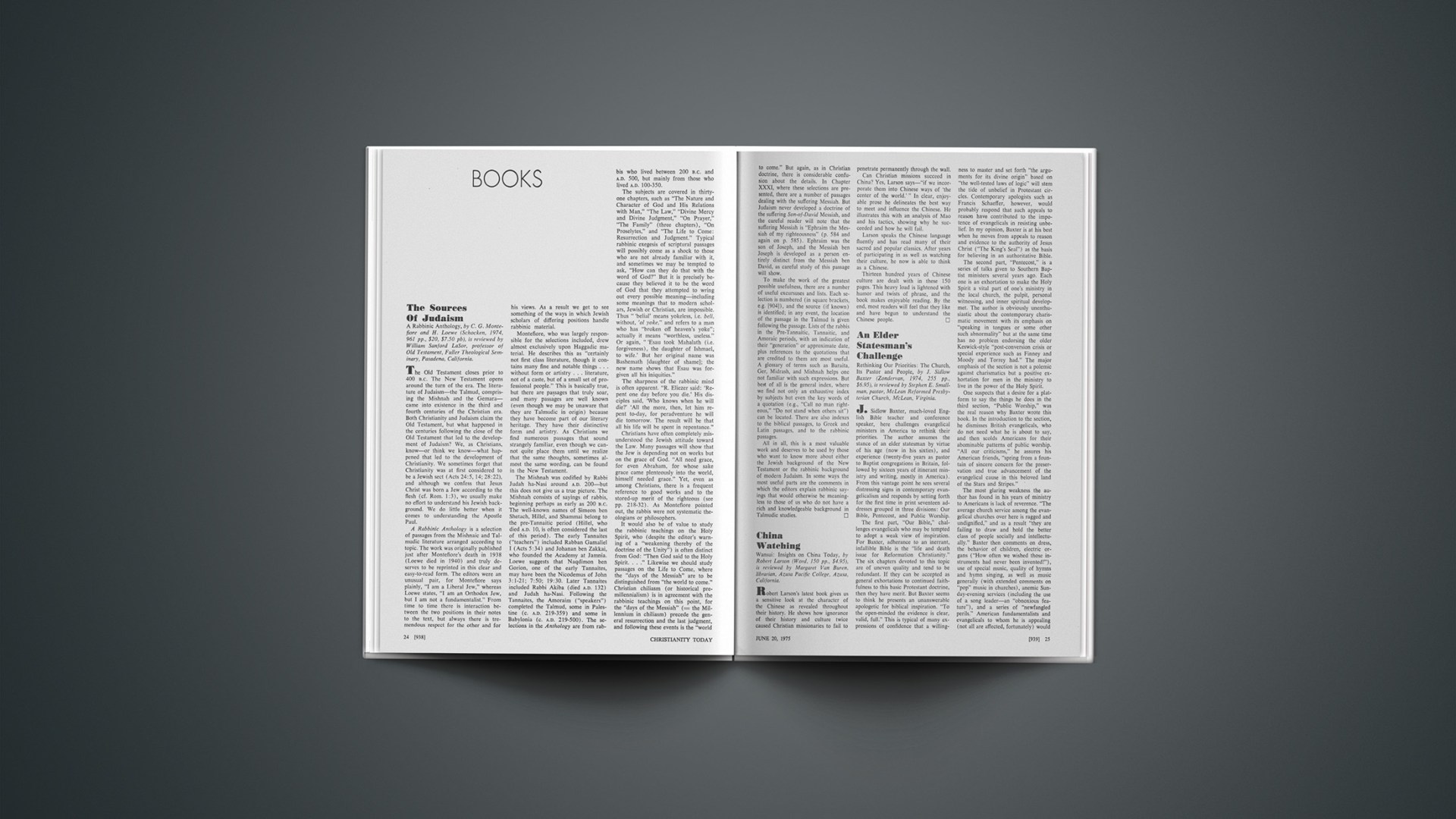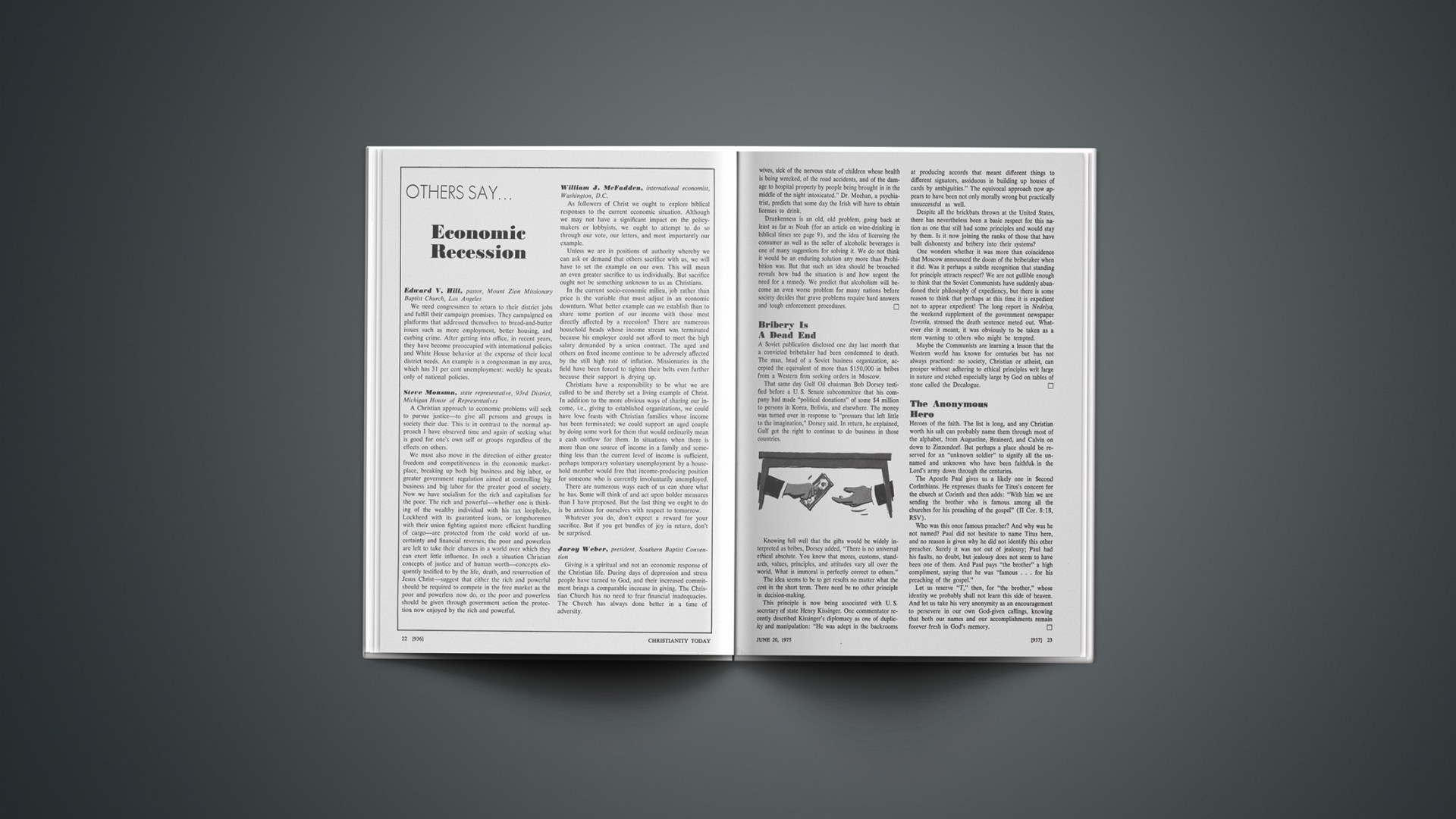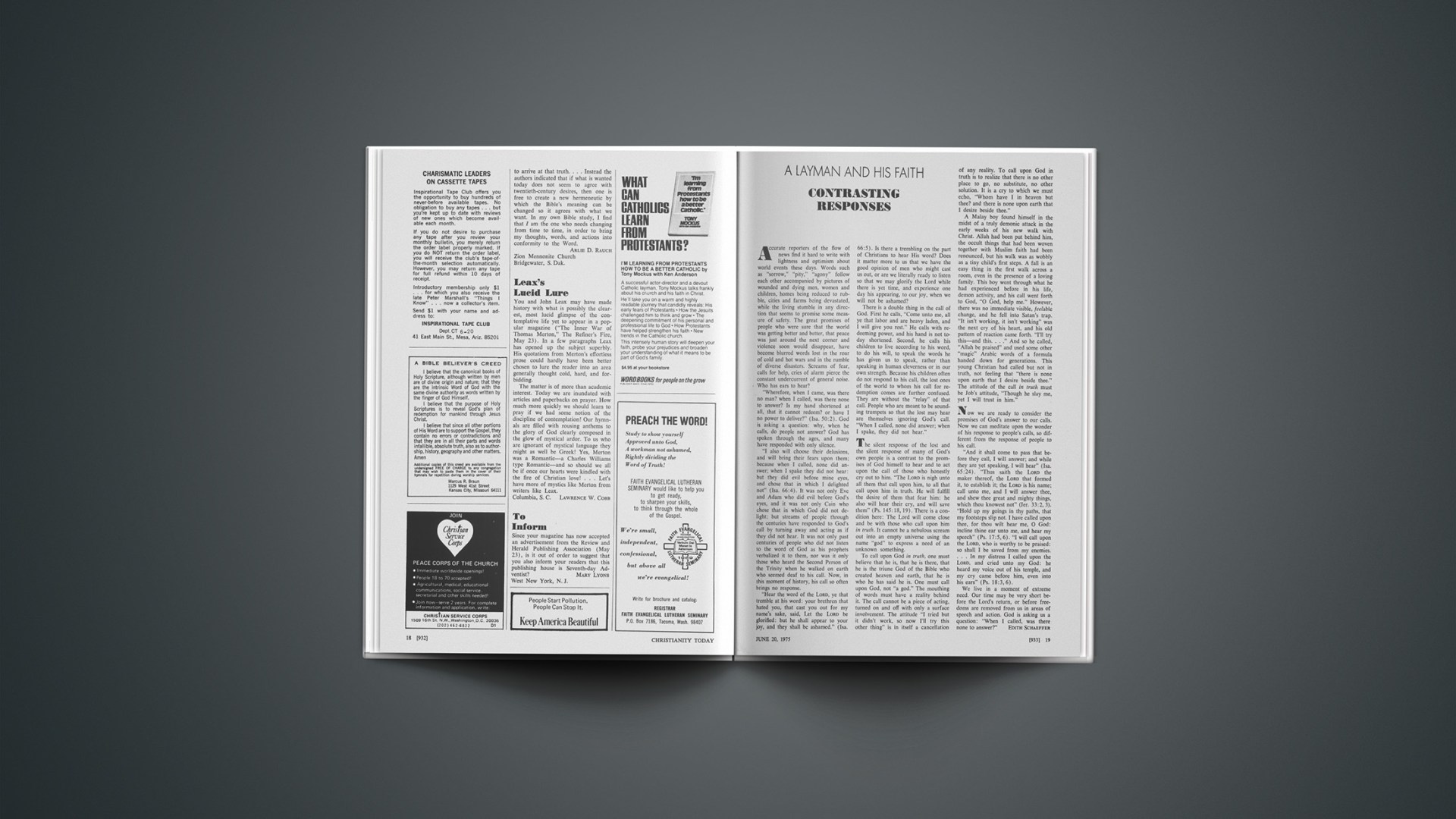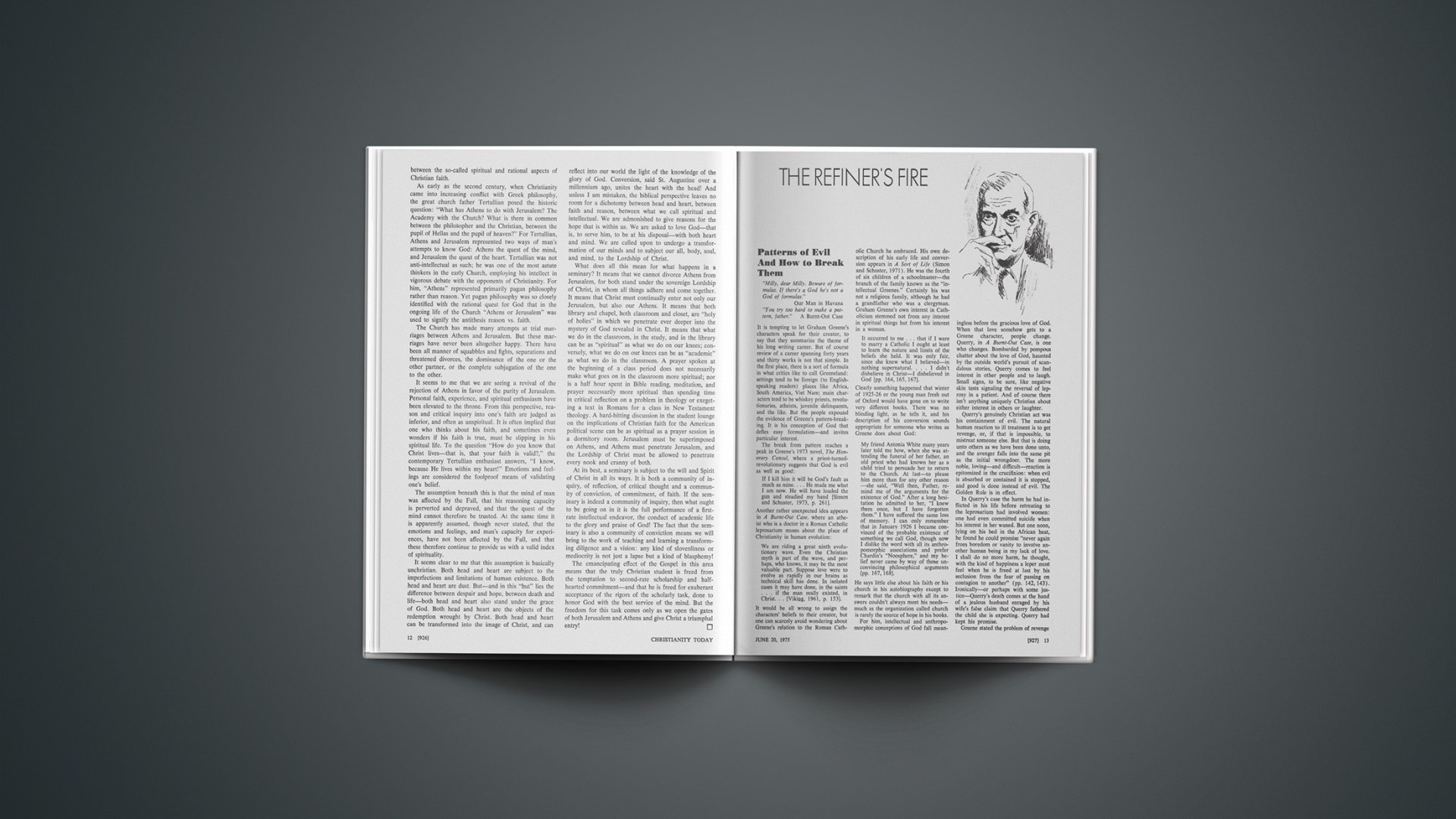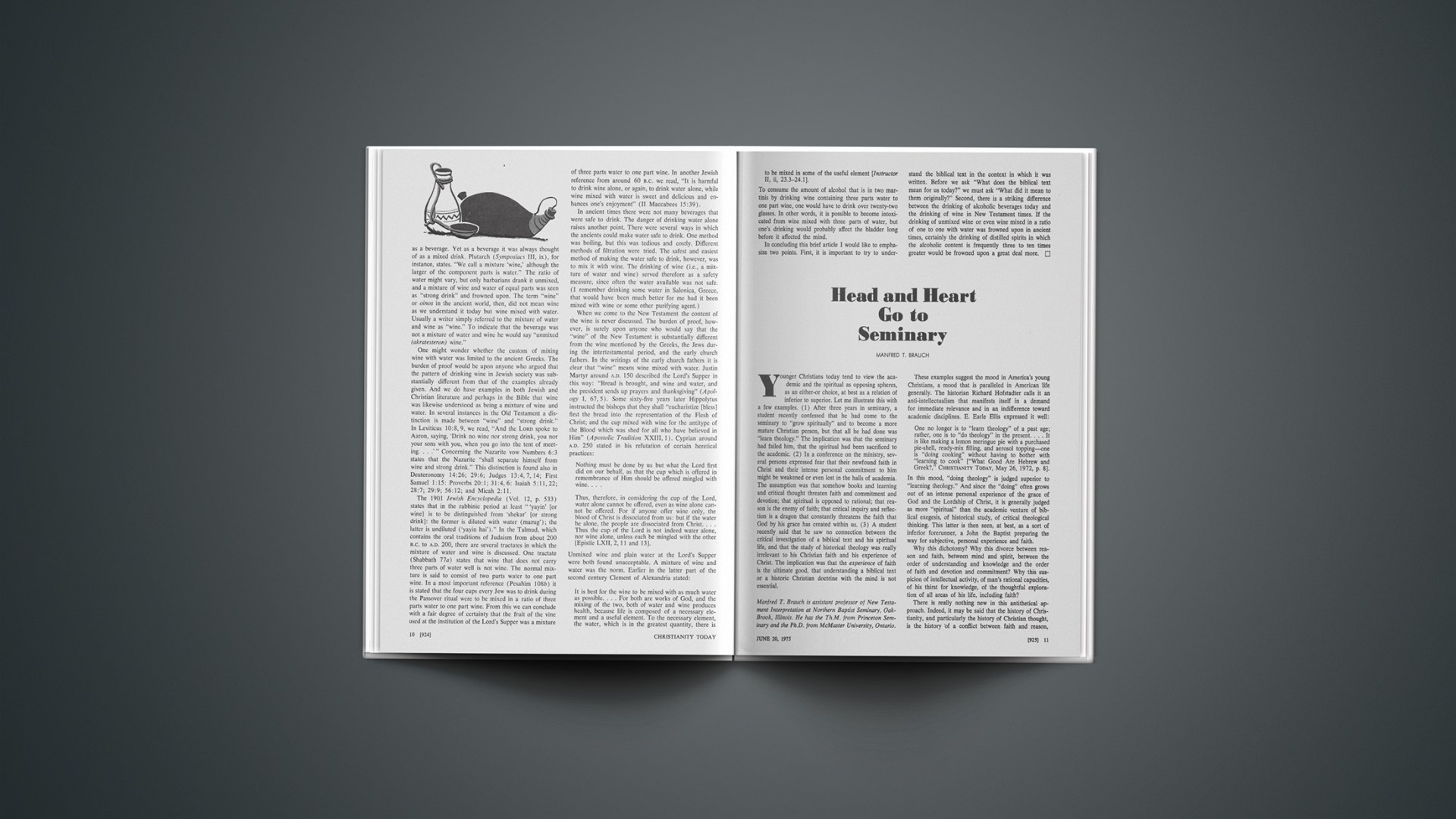Italian Catholics and Protestants alike were caught off guard by what took place in Rome when the Catholic Pentecostals hit town last month for their four-day congress on the “charismatic renewal” in the Catholic Church (see June 6 issue, page 45). Not since Francis of Assisi sang and marched happily through the streets of the Eternal City with his brothers the Friars Minor has Rome beheld such expressive Christian joy. “The atmosphere … was absolutely untypical of any great gathering of Catholics that has ever gathered in Italy, whether of traditionalists, or of the moderates, or of the progressives,” commented the Catholic-Protestant dissident weekly, Com-Nuovi Tempi. The paper in a front-page article criticized the gathering for its alleged anti-Communist stance.
Except for a vast distribution of the Bible in inexpensive modern translations, Catholic renewal in Italy has been principally liturgical and sociological. A great surge to the political left since Vatican Council II is monopolizing the energies of people and priests, and there is little evidence of the kind of spiritual renewal seen in Catholic circles in North America. Italian Catholicism is deeply divided between two camps: the leftist dissidents bent upon renewal of the church through political action, and the die-hard traditionalists, determined to shut the windows opened by Pope John XXIII. Italian Catholic charismatics are rare, although several groups of as many as 200 meet weekly in Rome and Milan.
Generally, Italian Protestants, 80 per cent of whom are Pentecostals, assumed a negative attitude toward the “biblical” or “born-again” Catholics (as many charismatics are described even by fellow Catholics) who seem determined to remain within the church of Rome. The Assemblies of God of Italy in a statement dissociated the denomination from the Catholic charismatics and reaffirmed the AOG’s “unique and total fidelity to divine revelation, as expressed in Sacred Scripture,” a slap of sorts at the Catholic view of tradition. The statement suggested that authentic present-day activity of the Holy Spirit must conform to apostolic standards as understood by the AOG. Said one Assembly of God pastor in Rome: “We refuse to extend fellowship to any charismatic who is satisfied to remain within the Roman church.”
Members of the Italian AOG, explaining their stand, pointed to the official statement on intercommunion printed in the congress program: “… those who receive Holy Communion not only receive the Body and Blood of Jesus Christ, but also publicly express their unity with the pastors of the Catholic Church, primarily the bishops and the Pope. Therefore, Catholic sacramental communion is only open to those who believe that the Eucharist is the Body and Blood of the Lord and who are in unity with the pastors of the Church.”
Opposition came also from the Italian Catholic left and right. Secular newspapers took little or no notice of the event before its opening day, except to oppose the city’s granting permission to erect five huge tents over the Catacombs of St. Callixtus for the meetings. Claimed religion writer Marco Politi in one of Italy’s major opinion-makers, Rome’s Messagero: “The charismatic renewal is a mass illusion … because it affects only the emotional area of the individual, and does not affect the reality surrounding it. Therefore, it doesn’t renew anything.”
Don Giovanni Franzoni, deposed rector of Rome’s St. Paul’s Basilica Outside the Gate and radical social-reforming Catholic dissident, denounced the charismatics as “hiding inside a spiritual vacuum” and said that the movement could mean the end of Catholicism as such.
Retired traditionalist hard-liner Cardinal Alfred Ottaviani, 85, who continues to exert a strong influence in the Vatican Curia, expressed a negative view of the charismatics that is bound to offset to some extent in the Curia the “approval” given the charismatic renewal by Pope Paul VI on the final day of the congress. Admonished Ottaviani: “The aggressive spiritualism of the neo-Pentecostals over the long-haul risks producing a split, dividing the Catholic world into those Catholics who possess the fervor of the Holy Spirit, and those who are just common Catholics.”
Two of Italy’s largest and most influential newspapers omitted mention of the papal audience at St. Peter’s and the tacit approval the Pope gave the movement. The seeming snub is seen by some as further evidence of disapproval of the movement by influential Catholics in Italy.
St. Peter’s Basilica will never be the same for any Protestant witnessing the moving scene just prior to the Pope’s arrival to speak to the participants. The vast church was filled with the majestic strains of ten thousand voices singing “Spirit of the living God, fall fresh on me.” “Jesus is Lord, Jesus is Lord” resounded again and again throughout the building. Charismatic Catholics may be determined to do obeisance to the vicar of Rome and to the doctrine of the Roman church, comments a Protestant observer, but the reality of the living faith of many of those at the congress cannot be doubted.
MARRIAGE OPTION
A bride doesn’t have to say “obey” in the new Church of England marriage service, the first major change in the rite since the Book of Common Prayer was issued in 1662, according to a Religious News Service report.
A church spokesman said that while the word “obey” does not appear in the service, a bride can opt for it “on the clear understanding that she freely undertakes it, that it is at her request, and that she is not doing it because the vicar or her parents have bullied her into doing it.”
De-Catholicization?
Italy isn’t the only place where Catholic charismatics met with mixed reactions last month (see preceding story). In Ottawa, Canada’s Catholic bishops issued a sixteen-page statement declaring the movement to be solidly grounded in the “trinitarian structure of the Christian faith.” However, they also warned of “excesses” that sometimes focus on “dazzling” gifts (tongues or prophecy) at the expense of love and other virtues. The bishops cautioned against “emotionalism” and a tendency toward “literal interpretation of Scripture” and “false ecumenism.”
But overall, the movement got good marks for its concern about brotherhood and witness, the obvious joy manifest in the lives of adherents, and the emphasis on prayer.
The document described “baptism in the Spirit” as not a second baptism but “a symbolic act signifying a new openness in the believer to the Spirit received at baptism.”
Strong opposition to the movement came from one of its founders, church-history professor William Storey of Notre Dame. Storey, who was part of the group that launched the movement in 1967 at Duquesne University in Pittsburgh, says he broke with it because of leadership policies and “exaggerated or incorrect” theological positions. Basically, he’s worried about the “de-Catholicization” he sees going on in the movement.
In an interview published in A. D. Correspondence, Storey mentions “theological errors and patterns of religious response which cannot be reconciled with authentic Catholic tradition” mixed with an alien “authoritarianism” among leaders. He also lists as problems the reliance on personal or group discernment of the Holy Spirit rather than on theological disciplines and church authority, the absence of structured procedures to confront abuses, the danger of “biblical fundamentalism,” a de-emphasis on liturgy and the sacramental life of the church, and the growing influence of Protestant thought and practices.
Storey suggests that an investigating commission be set up and that compassionate action be taken toward error, Catholicizing the movement while avoiding schism.
The Kirk And Catholics: Brothers At Last?
“What do brothers say to one another after … centuries of estranged silence? Surely they ask forgiveness.”
With a ten-minute address that might have been taken from Pope John’s journal, the Catholic archbishop of Glasgow, Thomas Winning, ended that 415-year silence by addressing the general assembly of the Church of Scotland last month in Edinburgh. Not all the 1,327 commissioners joined in the loud applause, but none dissented, nor was there trouble from the public gallery. Pastor Jack Glass, Ian Paisley’s Scottish sidekick, had been neatly intercepted under John Knox’s statue as he made toward the assembly hall wearing a smock with slogans that did not wish the Pope well. He surrendered his admission tickets, was given his money back, and rejoined his small group, which was about its annual protesting business.
The Free Church assembly, also meeting in Edinburgh, and the Free Presbyterian Church synod in Inverness likewise protested this further evidence of the national church’s apostasy. The F.P.’s said that the Reformers had “every good reason to regard with abhorrence a system that made merchandise of the souls of men,” and condemned British membership in the European Economic Community (EEC) as posing “serious dangers to our civil and religious liberties” because of the EEC’s Roman Catholic majority.
But if the Kirk was a day’s march nearer Rome, the assembly’s ecumenical favor chilled toward the Scottish Episcopal Church, with which the assembly agreed to drop conversations because that 46,000-communicant body had “been unable to present any formulation of the doctrine of episcopacy that would commend itself to the Church of Scotland.” With a logic that was not too apparent, nonetheless, the Kirk agreed to continue multilateral talks with five other Scottish groups.
This is not to say that the Catholics departed with joy unalloyed, for later in the sessions Kirk clergyman Henry Munroe of Denny challenged the Catholic attitude toward the religious upbringing of children of mixed marriages. Although the non-Catholic parent does not sign anything, he or she is fully committed by a promise that the Catholic must sign; any breach of it is regarded by the Scottish Catholic hierarchy as against the law of God. The Kirk establishment resisted any proposed action on Munroe’s objection, but the assembly by a small majority agreed that the matter be raised with Catholic officials.
Less successful was a proposal by minister Jack Kellett of South Leith, who wanted the British government censured because, in a world hungry for food, it employed a team of men to fly round the world trying to compete with other nations in selling arms. The assembly agreed that it would be enough to urge the administration to take every possible initiative to bring about limitation and control of the arms trade between governments.
The world’s food crisis was cited also by the Very Reverend Lord MacLeod, the assembly’s most entertaining speaker and regular espouser of lost causes. Britain could better grapple with the crisis, he maintained, by withdrawing from the EEC. Delightedly the fathers and brethren heard his impassioned speech, which ended with a splendid but dubiously relevant quotation from Malachi. Clergyman W. B. Johnston, convenor of the Church and Nation Committee, was unimpressed, calling the minister-peer’s contribution “mischievous” and a “party political broadcast.” Johnston urged the assembly not to allow Lord MacLeod to tell it how to vote in the June 5 referendum (when Britons were due to decide for or against continued participation in the EEC). As usual, George MacLeod lost; one almost feels he would regard it as an affront if he were found to be in the majority.
A stern attack was made on church members involved in the sale of alcohol by minister Peter Bisset, a well-known evangelical who is convenor of the Moral Welfare Committee: “They cannot ignore the fact that growing sales which spell prosperity for the trade spell degradation and disaster in the lives of many.” Such victims, continued Bisset, need the Kirk’s understanding because they are not fighting alcohol so much as the “terrible lie that real life depends upon alcoholic drink—that here is the secret of manliness, the source of sociability, the very fountain of all good and gracious living. You can’t portray that in your advertising, convey it in your attitudes, sell it in your entertainment industry, and then be surprised that you have a growing problem of under-age drinking.”
The assembly also:
• elected the Reverend James Matheson of Skye as moderator;
• approved the appointment of the Reverend D. W. D. Shaw as principal of New College, Edinburgh;
• heard that Kirk membership over the past year had dropped 27,000 to 1,061,706;
• encouraged ministers to give respite to hard-pressed Irish colleagues by offering to serve a month or two in Ulster;
• agreed that a basis and plan of union with Scottish Methodists (40,000 members in fifty-eight congregations) should be drawn up, hopefully in time for the 1976 assembly.
J. D. DOUGLAS
LIFE ON DEATH ROW
More than 200 prisoners in Ghana are enrolled in Bible correspondence courses offered by the Sudan Interior Mission in a full-page ad each month in the nation’s leading newspaper, the 180,000-circulation Daily Graphic in Accra. The courses are produced by Emmaus Bible School in Oak Park, Illinois.
One of the prisoners wrote SIM: “It was through the courses that I accepted Christ as my Saviour. Though I have been sentenced to death, I have told the truth and have repented. I know God has forgiven my sins.”
Bangladesh Update
Famine and poverty continue to draw world attention to Bangladesh. More than 100 relief agencies currently are working among the 75 million people of the fledgling nation. Among these are such evangelical organizations as World Vision, World Relief Commission, and Medical Assistance Programs, which combine spiritual ministry with physical assistance.
Recently, Sheikh Mujibur Rahman introduced a mandatory one-party system of government that in turn installed him as president of Bangladesh. He now has almost unlimited power. There is a new spirit of hope among the Bengali people that perhaps this “second revolution” will curtail raging inflation and widespread lawlessness.
Evangelism is a growing concern among the leading Christian nationals. Subash Sangma, a member of the Lausanne Continuation Committee, resigned his position as executive secretary of the Bangladesh National Christian Council to become an independent evangelist. In a meeting among his own tribesmen, 185 Garos professed Christ and were baptized.
A large number of Hindus have embraced Christianity. Also, scores of Muslims have confessed Christ through the ministry of Andrew Akand, a young intellectual zealot who is a Muslim convert himself. Akand has introduced a biblically sound yet culturally attractive faith to the Muslims of a northern district of Bangladesh. He hopes to establish a chain of indigenous churches that meet on Fridays for worship and instruction (Friday is the Muslim world’s holy day).
Peter McNee, a New Zealand Baptist missionary, is in the final stages of research for his projected 200-page report on church growth. It is anticipated that this survey will be the basis for an intelligent reassessment of past failures as well as a foundation for further progress.
McNee got the inspiration for his research project while attending a church-growth conference last fall in Bangladesh. It was conducted by church-growth specialists Donald McGavran of Fuller Seminary and Vernon Middleton of Union Biblical Seminary in Yeotmal, India. They were assisted by Ezra Sargunam, a zealous and successful church planter who baptized more than 200 converts in Madras not long ago. The 209 conferees included Bengali, Garo, Santali, and Bawn pastors and church leaders plus missionaries from eight countries. They devoured mimeographed reports on church growth and gobbled up several hundred dollars worth of books.
One Bengali declared his intention to establish three churches in as many Muslim villages over the next year. “We must not allow this emphasis to die,” exhorted Subash Sangma, who agreed to head up continuation efforts.
McGavran notes that the hill tribes are increasingly receptive to the Gospel but that few missionaries know the tribal tongues. A “people-movement” to Christ has developed among the Santalis; if cultivated, it could church most of the tribe, he says. The Lutheran Church in the last three years, he points out, has grown from 1,500 to about 10,000—“and could grow much more.”
The crucial evangelistic question, says McGavran, is: “Can the churches and missions, which are geared to lowland Bengali work, shift gears quickly enough to train and deploy sufficient workers to meet the famine of the Word of God among the tribes?”
PHIL PARSHALL
Retort From Taiwan
Nationalist China denied charges last month by officials of seven U. S. Protestant denominations who claimed that authorities on Taiwan were guilty of violating religious freedom. The Americans had cited the government’s confiscation of Bibles earlier this year and a ban on Bible study in some languages (see June 6 issue, page 47).
The Bibles were “surrendered” after it was pointed out to the printer that they did not conform to language laws, said the government’s information agency (Mandarin Chinese has been designated as the official language on Taiwan). The Taiwan Bible Society issued a statement similar to the government’s and said no force was involved in removal of the Bibles. New employees unfamiliar with the language law reprinted a 1933 version of the Bible, explained the statement.
China’S Millions
Most of the Chinese Protestants in North America are evangelicals, but they keep pretty much to themselves. That must change, said General Secretary Thomas Wang of the Chinese Christian Mission at a consultation in Chicago last month; Chinese evangelicals need to move into the mainstream of evangelicalism while maintaining their identity.
The consultation, called by the ad hoc Evangelical China Study Group, brought together about eighty-five Chinese lay and clergy leaders, evangelical mission leaders, and a few former missionaries to China.
Speakers and conferees in small-group sessions tried to sort out roles and priorities of Chinese and non-Chinese believers alike in trying to reach the world’s hundreds of millions of Chinese for Christ.
Wang predicted an increasing need in the future for “non-subsidized” witnesses because of economic conditions in the West and the political situation elsewhere.
Wheaton College president Hudson Armerding emphasized that Chinese Christians outside of China must be prepared to be the point of contact and fellowship with the church in China when the door to the mainland is open again. Non-Chinese must be content to remain in servant roles in the background, he said.
Meanwhile, stressed Fuller Seminary missiologist Arthur Glasser, some hard study is needed on exactly how to present Christ to the Chinese, especially the “new” mainland Chinese raised so differently from the past.
The group agreed to meet again later on. Also ahead: Love China ’75, a five-day study seminar in September in Manila convened by fifteen organizations, and the Chinese Congress on World Evangelization, to be held in Hong Kong in October, 1976.
Religion In Transit
The New Hampshire legislature passed a bill permitting voluntary recitation of the Lord’s Prayer in public elementary schools at the option of local school districts. The Connecticut legislature approved a measure providing for an optional period of silent meditation at the beginning of the school day. New Hampshire’s action is in apparent conflict with the U. S. Supreme Court’s 1962 ruling that outlawed prayer in public schools. Connecticut’s law is similar to a Pennsylvania provision that has withstood court tests.
Alaska’s Supreme Court ruled last month that citizens have a constitutional right to possess marijuana for personal use in their homes (but not in public). It is thus the first state—and one of the few places on earth—where pot may be smoked legally. Ironically, the ruling did not reverse the conviction of the man who brought the case. He was using the stuff in his car.
A federal court in San Francisco ruled that the Universal Fellowship of Metropolitan Community Churches (MCC) for homosexuals is a bona fide church,but the court left intact a ban prohibiting the MCC from holding services for homosexual inmates in California prisons until the completion of hearings to determine whether such services would undermine prison discipline and security.
California governor Edmund Brown, Jr., signed into law a bill legalizing any private sex acts between consenting adults, including homosexuals, effective January 1. Church groups are speaking out in opposition and gathering signatures for a June, 1976, referendum aimed at voiding the law.
Charges of simple assault were filed in Charlotte, North Carolina, by Daniel Lewis Pollock, 28, against Ruth Graham, wife of evangelist Billy Graham. During a Bicentennial rally at which her husband spoke, Mrs. Graham “instinctively” took from demonstrator Pollock a sign he was carrying. It said, “Don’t tread on me,” a slogan of the American Revolution. Mrs. Graham placed the sign beneath her feet and police made Pollock move on. Legal proceedings were pending this month.
Thousands of young people are expected to attend Jesus 75 on Paul Mast’s potato farm in Morgantown, Pennsylvania, August 14–16. The headliners include Andrae Crouch, Katie Hanley, the Rambos, Larry Christenson, Tom Skinner, Paul Little, and Loren Cunningham.
The Vanderbilt University Divinity School in Nashville will become the first major American seminary to have a woman in its top academic and administrative post when Sallie TeSelle, 41, succeeds Walter Harrelson as dean in July. A teacher at Vanderbilt, Mrs. TeSelle holds a Ph.D. from Yale.
“Heartbeat,” a one-minute radio spot sponsored by the Churches of Christ, is being heard thirteen times a week during evening news programs on the NBC radio network. It is the first time NBC has sold air time for evangelistic programming other than on Sunday morning, says a church spokesman.
Except for the world-missions budget, giving to the fledgling Presbyterian Church in America is lagging by half or more behind the budget, and the administrative wing of the denomination has been forced to borrow from a bank to meet minimum obligations. The information was contained in an “urgent appeal for funds” to keep the PCA afloat.
Conservative columnist and editor William F. Buckley, Jr., was awarded $7,500 in punitive damages and $1 in compensatory damages against United Methodist clergyman Franklin H. Littell, a professor of religion at Temple University, in a libel suit. Littell had suggesed in a 1969 book that Buckley was a fellow traveler of fascists.
Oswald P. Bronson, 47, has resigned as president of Atlanta’s Interdenominational Theological Center to become president of Bethune-Cookman College in Daytona Beach, Florida.
DEATH
ALDEN R. WEST, 40, editor of Logos Journal, the well-known bi-monthly of the charismatic movement; in Plain-field, New Jersey, of leukemia.
Personalia
New bishops: William Hawley Clark, 55, Episcopal bishop of the 20,000-member diocese of Delaware (from ecumenical work in Massachusetts), and John B. Coburn, 60, Episcopal bishop of the diocese of Massachusetts (the rector of a New York church, he was formerly dean of the Episcopal Seminary in Cambridge, Massachusetts, and is president of the denomination’s House of Deputies).
Professor Theophilus J. Herter of the Reformed Episcopal Seminary in Philadelphia was named presiding bishop of the 7,000-member Reformed Episcopal Church, succeeding Bishop Howard D. Higgins.
Rabbi Baruch Korff, one of former president Richard Nixon’s last defenders, quit as volunteer head of a fund created to pay $400,000 of Nixon’s legal fees ($190,000 has been raised, says Korff).
Editor Wilson O. Weldon of The Upper Room, a daily devotional guide has left the publication to become a United Methodist district superintendent in Charlotte, North Carolina.
Joseph L. Knutson, 69, has retired after twenty-four years as president of the American Lutheran Church’s Concordia College in Moorhead, Minnesota.
Resigned: Paul T. Losh, president since 1956 of the 165-student Central Baptist Seminary, an American Baptist Churches-affiliated school in Kansas City, Kansas.
World Scene
Scripture distribution throughout the world by the United Bible Societies hit a new high of 254.1 million copies last year; 6.1 million were complete Bibles, and 12.2 million were Testaments. Scripture is now available in 1,549 languages (the complete Bible in 257 and New Testaments in 368).
An appeal charging that the trial of imprisoned dissident Baptist leader Georgi Vins was illegal was rejected by the Ukrainian Supreme Court, according to Keston News Service of London. Relatives have asked the United Nations Human Rights Commission and Amnesty International for help.
Northern Ireland firebrand preacher Ian Paisley recently opened the first church of his 25-year-old, thirty-nine-congregation Free Presbyterian Church of Ulster across the border in the Irish Republic.
HCJB International has moved its television department from Quito, Ecuador, to San Juan, Puerto Rico.
PUNCH 75, a major evangelistic campaign to be held this summer on the beaches of Languedoc on the French Mediterranean coast, has caught the interest of the Catholic Church in France. The Catholics would like to participate in prayer meetings, Bible studies, and pastoral follow-up of the outreach, which is being sponsored by Radio Evangile, Decision magazine, Youth for Christ, Scripture Union, and the French Reformed Church. PUNCH committee members are glad for the Catholic interest, says the French Evangelical Alliance.

